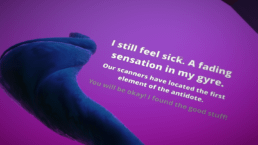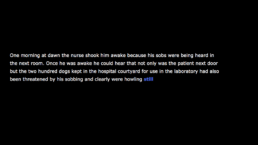Slimedaughter.com : The Games of Porpentine Charity Heartscape
Adam Tedesco
Part multimedia art, part literary experiment, the games of Porpentine Charity Heartscape range from text-based branching narratives, to low-res Atari-style graphic scrollers, to surreal 3D environments. Players can navigate these creations through prompted decision making and cursor queued movements, slowly making sense of the game play as narrative develops through accretion. As gallerist Telematic writes: “To get through one of Porpentine’s stories, players must familiarize themselves with the world in which they find themselves, repeatedly confronting obstacles and other characters, primarily as passages of text. The repetitions are banal, reminiscent of the toils of everyday life; and they are sublime, provocative and opaque, like modernist poetry.”

Likening these games to poetry is no stretch. Take for example the 3D game Bellular Hexatosis, which Heartscsape describes the plot of as “fly to the eyeball city, locate rare tears, explore your guts, get the antidote for your dying sister”, or The Right Color for Blood, a “machine-poem / toxin purging ideation ritual.” While the former is much richer visually, and more expansive in concept, both function through disjunctive text and symbols, narrative occurring only through a willingness to read for it.

The text-based Howling Dogs begins with quote from Kenzaburō Ōe, then several screens later the player is told “Immersed in a room where every surface is glowing screen. A meadow of green grass and breezy flowers. The wind rises and falls with your heartbeat. In the distance, a thin strip of forest”, an ominous holding pattern while navigating an institutional psychoscape.
These games speak to experiences of alienation, uncertainty, trauma, and healing. Vesp: A History of Sapphic Scaphism begins with the exclamation “My therapist bugged my apartment” and unwinds from there into a story that feels like a conflagration of genderpunk, sci-fi, and body horror.

ULTRA BUSINESS TYCOON III is the most overtly political of the Heartscape’s work, hilariously twisting and turning well-worn cyberpunk phrasing to deliver its dystopian critic of capitalism.
“Weapon Chef’s grill chest flares occasionally with gouts of
blue-red fire. Its iron face swivels and chants:
FILL MY CHEST WITH THINGS THAT KILL
AND I’LL COOK YOU CASH ON MY MAGIC GRILL”
This language-play endears me, like poetry, can alternate from conspicuously constrained to Dadaistic, or Steinian, convolution.
The experience of playing these games is all about repetition. Not in the conventional gaming sense of improved performance through repeated plays, but rather the deliberate repetitiveness inherent in their design. In an interview with Artforum, Heartscape stated “I do love games. I think about them all the time, and they inform a huge part of my aesthetic. But the game industry tries to make something that someone can play forever. What they’re manufacturing is the promise that you will not have to consider the ruinous passage of time, if you just lock yourself inside a game.” With this in mind, it’s hard not to feel a critique of modern gaming in this repetitiveness, as though the player is constantly being reminded of the fact that they are playing a game, and in such performing a task. In turn, I feel a Debordian critique at play, a hyperawareness of modern life, and in it my role as performer in a theater of spectacle.
*
Adam Tedesco is a founding editor of REALITY BEACH, a journal of new poetics. His video work has been screened at MoMA PS1, among other venues. His poetry, essays, and interviews have appeared or are forthcoming in Fence, jubilat, Posit, Conduit and elsewhere. He is the author of several chapbooks, most recently Misrule (Ursus Americanus, 2019). His first full-length poetry collection, Mary Oliver, was published by Lithic Press in February.